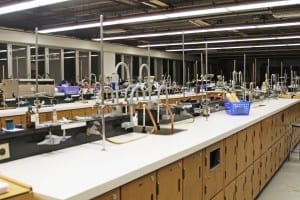Researching for meaning

The U of R should collaborate with a purpose.
I usually don’t think of the U of R as a major player in research. Let’s face it, we are not known for our state-of-the-art laboratories, and it is Saskatoon that has the Canadian Light Source synchrotron. To me, the U of R has always seemed to be an extension of high school, a good undergraduate university, but not a place where you do groundbreaking work. Then, I read that according to Canada’s Top 50 Research Universities, we are apparently ranked number two out of all Canadian universities for research reports done in collaboration with foreign researchers; 51.1 per cent of our papers have this distinction. What this means is that our university apparently has a lot of foreign contacts around the world. On top of that, we have two Rhodes Scholars in our faculty. I doubt many students know just how much prestige the U of R has kept hidden from them.
However, alongside these facts stands one disturbing fact: the provincial government will cut the U of R’s research budget. In his letter to the Leader-Post, U of R Professor Emeritus Dr. Jack Boan lamented that while “Saskatchewan universities are positioned in the national picture,” they are being deprived of necessary research money. Boan laments that the government uses healthcare as an excuse to cut funding while telling universities that they need an educated workforce to compete in the world; presumably, this includes in the health sciences.
Bottom line is, some professors feel that the government is not backing its ‘we need universities’ rhetoric with the money to make universities important to the economy.
When I think of university research, I remember an op-ed article written on what the state of scientific inquiry is (the Carillon, Vol. 57, Issue 6, p. 18). Patrick Malone, the author of the piece, writes that we “just want to know about the results of the latest study as opposed to the process of achieving those results.” This is an incredibly perceptive insight into our science-obsessed culture. We do have a tendency to take the results at face value, because we place a lot of faith in scientists; this is no oxymoron. The first modern scientists were not merely professionals working in labs, but philosophers seeking to examine an existing social order. Men like Sir Isaac Newton and Galileo explored the physical world in order to liberate our senses from a corrupt religious body whose leaders were more concerned about maintaining power on this earth rather than being ambassadors of a Higher Power in Heaven.
Today, university researchers are seen as a people above and removed from the common man. They spend their time in labs with specialized equipment and do tests on topics that we cannot fully understand. Therefore, we do not understand the particular accomplishments of scientists unless they attract the attention of their peers or they fulfill the goals of a corporation that needs some specific research done for them. Consequently, the struggles over such things as the Harper government’s restrictions on federal scientists’ freedoms of speech are not fully understood by the wider population. To be sure, it’s not like Newton immediately achieved rock star status amongst the English masses. But the concepts he discovered were fairly simple and helped introduce totally new ways of looking at the world. When have scientists today last done this?
Therefore, I feel that the U of R’s collaboration with other researchers is a good first step. In our world, there will be more co-operation between specialists of different countries. And there will always be a need to research things for profit: we will need better car seats, sturdier building materials and more effective medicines. I just hope that we can advance beyond researching things merely just to keep living for today. What fundamental purpose do today’s scientists and researchers have? Through collaborating with researchers across the globe, the U of R can take the lead in developing a research culture that seeks to examine the principles of the way we live.








